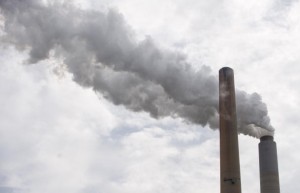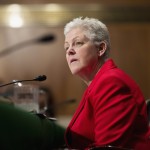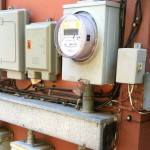Will Texas Even Bother Trying to Comply With EPA’s Clean Power Plan?

Photo by SAUL LOEB/AFP/Getty Images
New rules proposed by the Obama administration seek to reduce greenhouse gas emissions from power plants
As greenhouse gases reach their highest concentrations in human history, the Obama administration has pledged to take action on climate change, unveiling a Clean Power Plan this summer to go after a prime target of those emissions: coal power plants. And true to form, that plan is running into opposition from lawmakers and regulators in Texas.
At a hearing of the Texas House Committee on Environmental Regulation Monday, both regulators and lawmakers expressed concern in the feasibility of complying with energy regulations proposed in EPA’s plan.
“One of our main concerns is that they don’t reflect the reality of electric markets, which operate at the literal speed of light” said Brian Lloyd, Executive Director of the Public Utility Commission of Texas. “[The plan] requires very long-life, hugely expensive capital expenses.”
Lloyd said the Public Utility Commission would need to collect an additional billion dollars from ratepayers in order to achieve energy efficiency standards proposed by the EPA. Energy efficiency is one of several initiatives, including renewable energy generation and switching from coal to natural gas power generation shifting, that the agency calls for in its plan.
“Climate change, fueled by carbon pollution, supercharges risks to our health, our economy, and our way of life,” Gina McCarty, administrator of the EPA, said when announcing the plan in June. “EPA is delivering on a vital piece of President Obama’s Climate Action Plan by proposing a Clean Power Plan that will cut harmful carbon pollution from our largest source–power plants.”
Instead of calling for nationwide regulations, the EPA divided the states into regions and tailored goals for each. The plan gives states the power to create their own strategies to achieve its proposed goals.
Some officials, like Vincent Meiller, a technical specialist at the Texas Commission on Environmental Quality (TCEQ), questioned just how flexible the initiative is. He said the EPA’s goals for the southwest region, specifically Texas, are skewed.
“The EPA took certain state Renewable Portfolio Standards and averaged them,” Meiller aid. “In our region, however, they only chose one … Kansas.”
Officials like Meiller don’t believe Kansas’ energy industry is an accurate reflection of Texas.
“We couldn’t really find a good reason why they excluded ours,” he says. “So there are some inconsistencies in how they’re approaching things.”
Texas has until June of 2015 to draft its own strategy in compliance with the EPA’s plan. Though committee member, state Rep. Jason Villalba (R-Dallas), questioned whether or not Texas need comply at all.
“What if we just said no? There is precedent in Texas for telling the federal government that we are not going to be under the boot of the federal government’s authority,” he said.
In response, a representative from the Texas Commission on Environmental Quality ensured Villalba the EPA would enforce federal regulations in Texas.
Other issues that arose during the hearing included which state agencies would regulate and enforce Texas’ plan. The committee continues hearing testimony on the matter Tuesday.

